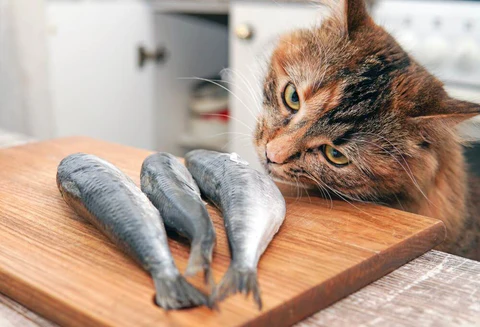Cats have long been associated with a love for fish, and for good reason. The scent, taste, and texture of fish make it one of the most tempting treats for our feline friends. But while cats may love fish, not all fish are good for them. If you’re a responsible cat owner looking to make the right dietary choices, you might be wondering: What is the best fish for cats? In this comprehensive guide, we’ll explore the healthiest options, potential risks, and how to safely include fish in your cat’s diet.
Why Do Cats Love Fish?
Cats are actually attracted to the strong smell seafood gives off, so the second they catch a whiff of that unmistakable aroma, excitement levels instantly shoot up. Fish is also an excellent source of protein and healthy fats, making it a dietary delight for nutrient-craving bodies.
What are the benefits of feeding fish to your cat?
- A fantastic source of protein. Fish is an excellent source of protein, which is critical to maintaining healthy muscles, organs, and blood vessels. As well as fuelling your cat’s bodies, proteins help ensure a functioning immune system, keeping them safe from many diseases. It’s also easy to digest.
- Packed with omega-3 fatty acids. These are found in oily fish and will give your cat’s immune system a boost while promoting brain health. They also have anti-inflammatory properties, can minimize arthritis issues, and are known for helping combat dull, lifeless coats.
- Vitamins and minerals. Fish contains a treasure trove of essential vitamins and minerals that are vital for a cat’s health.
Why Do Cats Have a Fascination with Fish?
Cats and fish have an innate connection. Whether it’s the sight or smell, many cats display a strong fascination with fish.
1 Instinctual Hunting Behavior: Cats are natural predators, and various stimuli, including fish’s movements and scent, trigger their instinctual hunting behavior.
2 Aromatic Attraction: The scent of fish is highly enticing to cats. Their sense of smell can detect the distinct aroma of fish from a considerable distance. This scent activates their appetite and triggers their hunting instincts.
3 Nutritional Value: Fish is a rich source of protein, omega-3 fatty acids, and essential nutrients. Historically, cats evolved as obligate carnivores, relying on meat-based diets for survival.
4 Familiarity and Conditioning: Cats are creatures of habit and associative learners. If a cat has been exposed to the taste and smell of fish at an early age, it may develop a strong preference for it.
5 Environmental Influence: Cats are observant creatures, and they are highly influenced by their environment and the behaviors of their human companions.
Health Benefits of Fish in a Cat’s Diet

1.Wild Salmon – A Nutritious Powerhouse
Salmon is one of the most popular types of fish given to cats and for good reason. It’s rich in omega-3 fatty acids, high-quality protein, and vitamins like B12 and D.
2.Tuna-Tasty but in Moderation
Tuna is often at the top of every cat’s wish list. It’s flavorful, aromatic, and packed with protein. However, it’s not without drawbacks.
3.Sardines-Small Fish, Big Nutrition
Sardines are an underrated but excellent choice when considering the best fish for cats. These small fish are rich in calcium, vitamin D, and omega-3 fatty acids.
4.Whitefish-Gentle and Lean
Whitefish varieties like cod, haddock, and pollock are lean, mild-tasting, and easy on the stomach. They’re commonly used in commercial cat foods due to their digestibility.
5. Mackerel – A Fatty Fish for Special Treats
Mackerel is oily, flavorful, and packed with nutrients. It’s rich in omega-3s and supports joint health and cardiovascular function.
Cats Eat Fish Every Day
Despite its benefits, fish should not be a daily staple. Too much fish can lead to:
1.Mercury poisoning
2.Nutritional imbalances
3.Allergies or food sensitivities
Fish should be a supplement – not a replacement for a balanced feline diet that includes other meat sources, vitamins, and minerals.
Aim for fish no more than 1–2 times a week unless prescribed by your vet.

Tips for Serving Fish to Cats
- Cook thoroughly – Steaming or baking is safest.
- Avoid seasoning – No salt, onions, garlic, or spices.
- Debone carefully – Fish bones can be dangerous.
- Moderate quantity – Treat fish like a side dish or topper.
- Using high-quality sources – Fresh or human-grade fish is ideal.
Conclusion: What Is the Best Fish for Cats?
Fish can be a wonderful addition to your cat’s diet when chosen and served properly. From salmon’s nutritious profile to sardines’ bone-building benefits, the best fish for cats are those that are low in toxins, high in nutrients, and served in moderation.
Remember, not all fish are created equal – and more isn’t always better. Talk to your vet before making any major dietary changes, and always watch for allergies or digestive issues.
With the right choices, fish can keep your feline friend healthy, happy, and purring with delight.





